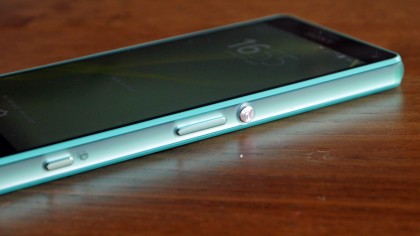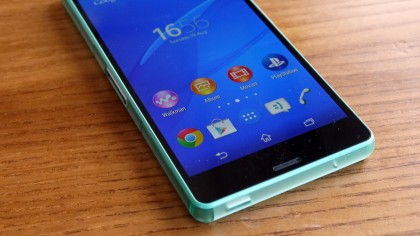Sony Xperia Z3 Compact vs Sony Xperia Z1 Compact
Battery
Even though the Xperia Z3 Compact is a millimetre thinner than the Z1 Compact, Sony has still managed to fit in a larger battery in the new model. This time around you get a 2600mAh unit instead of a 2300mAh one.
Sony says the Sony Xperia Z3 Compact will last for a solid two days from a charge, but thanks to the larger screen it isn't quite as long-lasting in all tasks. For example, the Z1 Compact will last for up to 12 hours of video, but that's chipped down to 10 hours in the Z3 Compact.

Talk time has been reduced by four hours too, from 18 hours to 14. The Xperia Z3 Compact's stamina isn't quite as great as that of the old model, but it's good enough not to prove remotely annoying.
CPU / RAM
What we loved so much about the Sony Xperia Z1 Compact when it arrived was that it was just about the only small phone to offer the power and specs of its bigger brother. It uses the Snapdragon 800 2.2GHz, a quad-core processor shared with the Xperia Z1.
In a similar vein, the Sony Xperia Z3 Compact uses the same 2.5GHz Snapdragon 801 as the Xperia Z3. There are no CPU compromises to go with the shrunken size.

But how does the Snapdragon 800 compare to the Snapdragon 801? Well, the Xperia Z3 Compact gains an extra 300MHz in clock speed, which can't hurt.
However, the basic architectures of these chipsets are very similar. There's not a big generational gap between the two, and there are no massive efficiency improvements – as it proved by the smaller-screen model's longer stamina.
Sign up for breaking news, reviews, opinion, top tech deals, and more.
There are some improvements. The camera image signal processor is better in the Snapdragon 801, which should improve camera-shooting performance a bit, and the GPU's maximum clock speed is a fair bit quicker too.
In all honesty, we're not convinced a 720p phone like the Xperia Z3 Compact needs the extra grunt. But a bit of bonus power is like a free doughnut – you're not going to say no even if it doesn't really do you much good in the long run.
Price
When the Sony Xperia Z1 Compact first launched it went for around £430 (around $740, AU$850) SIM-free. And, no surprises here, that's exactly what Sony lists the Z3 Compact as.
Those hoping to see the phone sell for loads less than current top-end phones may be disappointed. But that's what these Compact phones are about – offering the high-end experience in a smaller package.
Now that it's a slightly older model, Sony lists the Z1 Compact at £399 (US$530, AU$559) SIM-free, but you're likely to be able to find some better deals from networks or retailers.
For example, in the UK Phones4U lists the Z3 Compact for free on contracts of £30 (about US$49, AU$53) a month while the Z1 Compact is available on contracts of £25 (about US$41, AU$44) a month, again without any up-front cost. You can also get a decent saving on the Z1 Compact if you shop around on Amazon.
It's unlikely you'll see the Xperia Z3 Compact for a load less than the retail price for a little while. So while Sony lists the prices as quite similar, you can probably save around £100 SIM-free, or about £120 over the course of a 2-year contract, if you get the Z1 Compact.
Early verdict
In some respects, the relationship between the Sony Xperia Z3 Compact and Z1 Compact is much the same as that of the Xperia Z3 and Z1.
This newer model gets you a bit more power, a slightly improved camera and a tweaked design that's a bit easier on the eye. However, the real star attraction of the Z3 Compact is that you get a significantly larger screen without adding to the size of the phone at all. It's a pretty impressive feat of handset design.
That the screen resolution hasn't been increased to match is a minor league disappointment. But for people who aren't in love with the idea of a huge handset but still want a high-end phone, the Xperia Z3 Compact should be just the ticket.
- Check out our hands on review of the Xperia Z3 Compact for more details.

Andrew is a freelance journalist and has been writing and editing for some of the UK's top tech and lifestyle publications including TrustedReviews, Stuff, T3, TechRadar, Lifehacker and others.